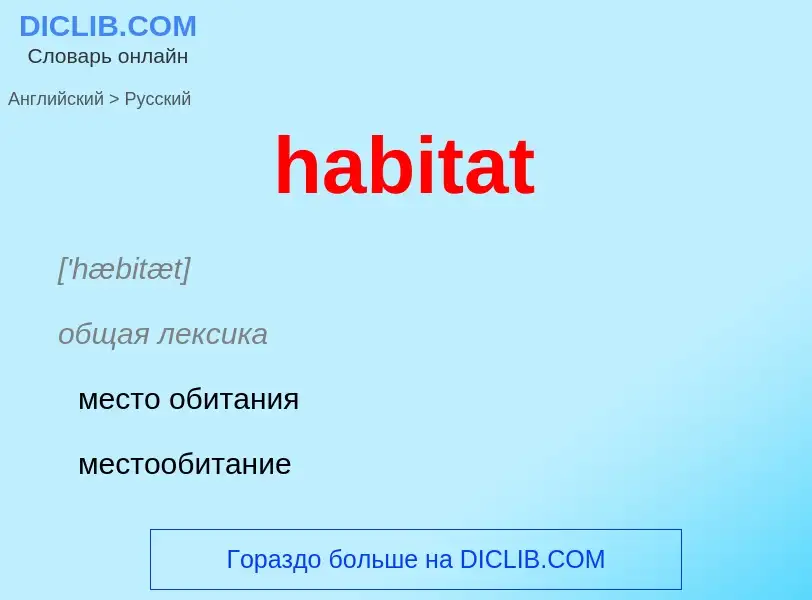Übersetzung und Analyse von Wörtern durch künstliche Intelligenz ChatGPT
Auf dieser Seite erhalten Sie eine detaillierte Analyse eines Wortes oder einer Phrase mithilfe der besten heute verfügbaren Technologie der künstlichen Intelligenz:
- wie das Wort verwendet wird
- Häufigkeit der Nutzung
- es wird häufiger in mündlicher oder schriftlicher Rede verwendet
- Wortübersetzungsoptionen
- Anwendungsbeispiele (mehrere Phrasen mit Übersetzung)
- Etymologie
Habitat - Übersetzung nach Englisch
['hæbitæt]
общая лексика
место обитания
местообитание
место распространения
естественная среда
габитет
стация
строительное дело
жилище
место жительства
среда обитания
подводный дом (лаборатория)
нефтегазовая промышленность
место, ареал
Смотрите также
существительное
общая лексика
естественная среда
жилище
жилищные условия
родина, место распространения (животного, растения)
биология
родина
место распространения
ареал
среда обитания (растения, животного)
этнография
место рождения
специальный термин
подводный дом (о морской лаборатории)
['hæbɪtæt]
общая лексика
"Хабитат" (название однотипных фирменных магазинов по торговле мебелью практичной, но элегантной конструкции, часто из соснового или неокрашенного дерева; находятся в Лондоне и др. городах; принадлежат компании "Хабитат мадеркэр")
дословная передача
естественная среда
синоним
Definition
My habitat is a blessing for making doileys for Xmas.
My habitat is a blessing for making Xmas presents.
Wikipedia
The United Nations Human Settlements Programme (UN-Habitat) is the United Nations programme for human settlements and sustainable urban development. It was established in 1977 as an outcome of the first United Nations Conference on Human Settlements and Sustainable Urban Development (Habitat I) held in Vancouver, Canada, in 1976. UN-Habitat maintains its headquarters at the United Nations Office at Nairobi, Kenya. It is mandated by the United Nations General Assembly to promote socially and environmentally sustainable towns and cities with the goal of providing adequate shelter for all. It is a member of the United Nations Development Group. The mandate of UN-Habitat derives from the Habitat Agenda, adopted by the United Nations Conference on Human Settlements (Habitat II) in Istanbul, Turkey, in 1996. The twin goals of the Habitat Agenda are adequate shelter for all and the development of sustainable human settlements in an urbanizing world.

![[[UN-Habitat]] headquarters at the [[United Nations Office at Nairobi]] [[UN-Habitat]] headquarters at the [[United Nations Office at Nairobi]]](https://commons.wikimedia.org/wiki/Special:FilePath/UN-Habitat offices in Nairobi.jpg?width=200)
